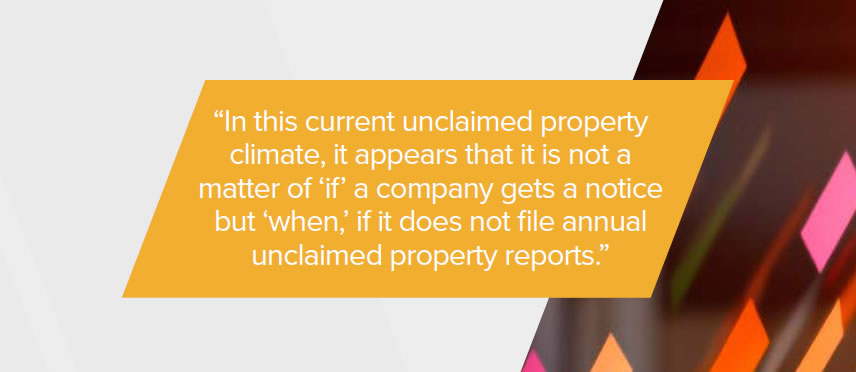States’ Effort to Find and Collect Unclaimed Property is on the Rise
By Angela Gebert, National Leader - Unclaimed Property
As we have emerged from COVID and things return to a new normal, states increasingly look to unclaimed property as a revenue resource and have significantly increased their efforts to track down non-filers or under-reporters. The states believe that only 5-10% of companies under $100M are addressing unclaimed property. This belief has led the states to attempt various outreach techniques to gain a higher rate of compliance.
States are utilizing the following outreach methods:
- Unclaimed property questions on income tax returns
- Questions during a state income tax or sales tax audit
- Compliance reminder notice
- Annual compliance report review
- Compliance surveys/questionnaires
- Self-audit notice
- Voluntary disclosure invite
- Audit notice by a 3rd party auditor
While state outreach methods come in many forms, the one thing they all have in common is that the notice still comes in paper format by USPS. This has created issues with timely responses to the notices with employees working remotely and not knowing something time-sensitive on their desks. If the response deadline is missed, the company can be turned over to a 3rd party auditor for a full-blown audit.
With so many different types of notices being sent by the states, it is essential to understand the following:
- Type of notice
- Notice response deadline
- Entities expected to be included in the review
- Lookback period
- Timeline expectations
- Reviewed by state or 3rd party auditors
- Extension availability
- Penalty for missing deadlines
- Additional stipulations (i.e., – mandatory education, 3-4 years of required future filings, etc.)
Once a company knows the full expectations of the notice received, it can work through the data and complete any necessary testing more efficiently. Failing to meet the state or auditor’s expectations could lead to additional testing, documentation, and require time to finish out the process. This can be costly to the company in terms of potential exposure and the expenditure of additional internal and external resources to achieve compliance.
Key takeaways
- All accounting, tax, executives, and mailroom teams should be on the lookout for unclaimed property notices and know who to route them to.
- Any company can receive these notices, regardless of annual revenues or being for-profit or non-profit.
- Unclaimed property is not a tax, so it has a much longer lookback than the IRS 7-year guidelines. States can lookback 10-15 years for unclaimed property.
- A company’s exposure may not be reflected on its balance sheet but rather what has been written off over the years.
- A company needs to ensure that adequate support for voided checks, accounts receivable credit write-offs, etc., are available to show why a liability is not owed.
- The burden of proof is on the company to prove something is not unclaimed property. For example, a state or auditor will take the stance that a voided check is owed unless the company can show it was reissued or not owed.

Experience has shown that being proactive is always better than being reactive when it comes to unclaimed property. Contact your Marcum representative to find out where the company’s exposure may lie and the best way to proceed before a notice is received, as there are many risk mitigation options available that can be tailored to your company and its fact pattern.





















